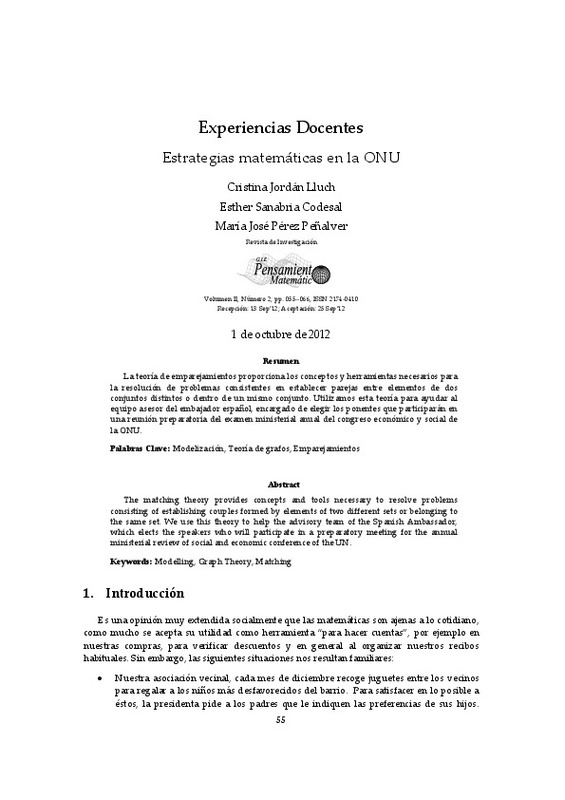JavaScript is disabled for your browser. Some features of this site may not work without it.
Buscar en RiuNet
Listar
Mi cuenta
Estadísticas
Ayuda RiuNet
Admin. UPV
Estrategias matemáticas en la ONU
Mostrar el registro sencillo del ítem
Ficheros en el ítem
| dc.contributor.author | Jordan Lluch, Cristina
|
es_ES |
| dc.contributor.author | Sanabria Codesal, Esther
|
es_ES |
| dc.contributor.author | Pérez Peñalver, María José
|
es_ES |
| dc.date.accessioned | 2014-10-24T10:48:04Z | |
| dc.date.available | 2014-10-24T10:48:04Z | |
| dc.date.issued | 2012-10 | |
| dc.identifier.issn | 2174-0410 | |
| dc.identifier.uri | http://hdl.handle.net/10251/43568 | |
| dc.description.abstract | [EN] The matching theory provides concepts and tools necessary to resolve problemes consisting of establishing couples formed by elements of two different sets or belonging to the same set. We use this theory to help the advisory team of the Spanish Ambassador, which elects the speakers who will participate in a preparatory meeting for the annual ministerial review of social and economic conference of the UN. | es_ES |
| dc.description.abstract | [ES] La teoría de emparejamientos proporciona los conceptos y herramientas necesarios para la resolución de problemas consistentes en establecer parejas entre elementos de conjuntos distintos o dentro de un mismo conjunto. Utilizamos esta teoría para ayudar al equipo asesor del embajador español, encargado de elegir los ponentes que participarán en una reunión preparatoria del examen ministerial anual del congreso económico y social de la ONU | es_ES |
| dc.description.sponsorship | This paper presents the single price multicriteria model applied in order to develop a full ranking of housings. With the application of this model we characterize the set of flats in equilibrium from both the seller and buyer views. Thus we are able to calculate an efficiency index in order to fully rank the flats. It states how in an equilibrium situation both views lead necessarily to inverse rankings. Opposite to other full ranking proposals, our methodology (i) assumes a moderately attitude on behalf of the decision-maker, formulated by means of a strong axiomatic approach, (ii) provides a weight for the criteria regardless of the evaluated housing and the optimistic or pessimistic attitude of the decision-maker and (iii) requires a minimum computational cost. The model is illustrated by a housing sample located in Valencia (Spain). | |
| dc.language | Español | es_ES |
| dc.publisher | Universidad Politécnica de Madrid | es_ES |
| dc.relation.ispartof | Pensamiento Matemático | es_ES |
| dc.rights | Reconocimiento - No comercial - Compartir igual (by-nc-sa) | es_ES |
| dc.subject | Modelling | es_ES |
| dc.subject | Graph Theory | es_ES |
| dc.subject | Matching | es_ES |
| dc.subject | Modelización | es_ES |
| dc.subject | Teoría de grafos | es_ES |
| dc.subject | Emparejamientos | es_ES |
| dc.subject.classification | MATEMATICA APLICADA | es_ES |
| dc.title | Estrategias matemáticas en la ONU | es_ES |
| dc.type | Artículo | es_ES |
| dc.relation.projectID | info:eu-repo/grantAgreement/UPV//518132-LLP-1-FI-ERASMUS-FEXI/ | es_ES |
| dc.relation.projectID | info:eu-repo/grantAgreement/UPV//PIME A13%2F11 2112/ | |
| dc.rights.accessRights | Abierto | es_ES |
| dc.contributor.affiliation | Universitat Politècnica de València. Departamento de Matemática Aplicada - Departament de Matemàtica Aplicada | es_ES |
| dc.description.bibliographicCitation | Jordan Lluch, C.; Sanabria Codesal, E.; Pérez Peñalver, MJ. (2012). Estrategias matemáticas en la ONU. Pensamiento Matemático. II(2):55-66. http://hdl.handle.net/10251/43568 | es_ES |
| dc.description.accrualMethod | S | es_ES |
| dc.relation.publisherversion | http://www2.caminos.upm.es/Departamentos/matematicas/revistapm/index4_vol_II_numero2.html | es_ES |
| dc.description.upvformatpinicio | 55 | es_ES |
| dc.description.upvformatpfin | 66 | es_ES |
| dc.type.version | info:eu-repo/semantics/publishedVersion | es_ES |
| dc.description.volume | II | es_ES |
| dc.description.issue | 2 | es_ES |
| dc.relation.senia | 227500 | |
| dc.contributor.funder | Universitat Politècnica de València |






